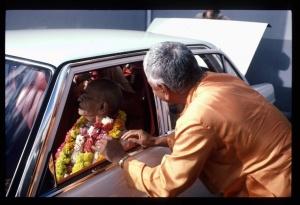SB 1.13.26: Difference between revisions
m (1 revision(s)) |
No edit summary |
||
| Line 1: | Line 1: | ||
{{info | {{info | ||
|speaker=Vidura | |speaker=Vidura | ||
|listener=King | |listener=King Dhṛtarāṣṭra | ||
}} | }} | ||
[[Category:Srimad-Bhagavatam - Canto 01 Chapter 13]] | |||
[[Category:Bhagavatam Verses Spoken by Vidura - Vanisource|011326]] | |||
<div style="float:left">'''[[Srimad-Bhagavatam]] - [[SB 1|First Canto]] - [[SB 1.13: Dhrtarastra Quits Home|Chapter 13: Dhṛtarāṣṭra Quits Home]]'''</div> | |||
<div style="float:right">[[File:Go-previous.png|link=SB 1.13.25]] '''[[SB 1.13.25]] - [[SB 1.13.27]]''' [[File:Go-next.png|link=SB 1.13.27]]</div> | |||
{{CompareVersions|SB|1.13.26|SB 1965|SB 1972-77}} | |||
{{RandomImage}} | |||
==== TEXT 26 ==== | ==== TEXT 26 ==== | ||
<div class="verse"> | |||
<div | :gata-svārtham imaṁ dehaṁ | ||
gata-svārtham imaṁ dehaṁ | :virakto mukta-bandhanaḥ | ||
virakto mukta-bandhanaḥ | :avijñāta-gatir jahyāt | ||
avijñāta-gatir jahyāt | :sa vai dhīra udāhṛtaḥ | ||
sa vai dhīra udāhṛtaḥ | |||
</div> | </div> | ||
| Line 18: | Line 23: | ||
==== SYNONYMS ==== | ==== SYNONYMS ==== | ||
<div class="synonyms"> | |||
<div | ''gata-sva-artham''—without being properly utilized; ''imam''—this; ''deham''—material body; ''viraktaḥ''—indifferently; ''mukta''—being freed; ''bandhanaḥ''—from all obligations; ''avijñāta-gatiḥ''—unknown destination; ''jahyāt''—one should give up this body; ''saḥ''—such a person; ''vai''—certainly; ''dhīraḥ''—undisturbed; ''udāhṛtaḥ''—is said to be so. | ||
gata-sva- | |||
</div> | </div> | ||
| Line 26: | Line 30: | ||
==== TRANSLATION ==== | ==== TRANSLATION ==== | ||
<div class="translation"> | |||
<div | |||
He is called undisturbed who goes to an unknown, remote place and, freed from all obligations, quits his material body when it has become useless. | He is called undisturbed who goes to an unknown, remote place and, freed from all obligations, quits his material body when it has become useless. | ||
</div> | </div> | ||
| Line 34: | Line 37: | ||
==== PURPORT ==== | ==== PURPORT ==== | ||
<div class="purport"> | |||
Narottama dāsa Ṭhākura, a great devotee and ''ācārya'' of the Gauḍīya Vaiṣṇava sect, has sung: "My Lord, I have simply wasted my life. Having obtained the human body, I have neglected to worship Your Lordship, and therefore I have willingly drunk poison." In other words, the human body is especially meant for cultivating knowledge of devotional service to the Lord, without which life becomes full of anxieties and miserable conditions. Therefore, one who has spoiled his life without such cultural activities is advised to leave home without knowledge of friends and relatives and, being thus freed from all obligations of family, society, country, etc., give up the body at some unknown destination so that others may not know where and how he has met his death. ''Dhīra'' means one who is not disturbed, even when there is sufficient provocation. One cannot give up a comfortable family life due to his affectionate relation with wife and children. Self-realization is obstructed by such undue affection for family, and if anyone is at all able to forget such a relation, he is called undisturbed, or ''dhīra''. This is, however, the path of renunciation based on a frustrated life, but stabilization of such renunciation is possible only by association with bona fide saints and self-realized souls by which one can be engaged in the loving devotional service of the Lord. Sincere surrender unto the lotus feet of the Lord is possible by awakening the transcendental sense of service. This is made possible by association with pure devotees of the Lord. Dhṛtarāṣṭra was lucky enough to have a brother whose very association was a source of liberation for his frustrated life. | |||
</div> | |||
<div | |||
<div style="float:right; clear:both;">[[File:Go-previous.png|link=SB 1.13.25]] '''[[SB 1.13.25]] - [[SB 1.13.27]]''' [[File:Go-next.png|link=SB 1.13.27]]</div> | |||
</div> | __NOTOC__ | ||
__NOTOC__ | __NOEDITSECTION__ | ||
Revision as of 02:55, 2 May 2021

A.C. Bhaktivedanta Swami Prabhupada
TEXT 26
- gata-svārtham imaṁ dehaṁ
- virakto mukta-bandhanaḥ
- avijñāta-gatir jahyāt
- sa vai dhīra udāhṛtaḥ
SYNONYMS
gata-sva-artham—without being properly utilized; imam—this; deham—material body; viraktaḥ—indifferently; mukta—being freed; bandhanaḥ—from all obligations; avijñāta-gatiḥ—unknown destination; jahyāt—one should give up this body; saḥ—such a person; vai—certainly; dhīraḥ—undisturbed; udāhṛtaḥ—is said to be so.
TRANSLATION
He is called undisturbed who goes to an unknown, remote place and, freed from all obligations, quits his material body when it has become useless.
PURPORT
Narottama dāsa Ṭhākura, a great devotee and ācārya of the Gauḍīya Vaiṣṇava sect, has sung: "My Lord, I have simply wasted my life. Having obtained the human body, I have neglected to worship Your Lordship, and therefore I have willingly drunk poison." In other words, the human body is especially meant for cultivating knowledge of devotional service to the Lord, without which life becomes full of anxieties and miserable conditions. Therefore, one who has spoiled his life without such cultural activities is advised to leave home without knowledge of friends and relatives and, being thus freed from all obligations of family, society, country, etc., give up the body at some unknown destination so that others may not know where and how he has met his death. Dhīra means one who is not disturbed, even when there is sufficient provocation. One cannot give up a comfortable family life due to his affectionate relation with wife and children. Self-realization is obstructed by such undue affection for family, and if anyone is at all able to forget such a relation, he is called undisturbed, or dhīra. This is, however, the path of renunciation based on a frustrated life, but stabilization of such renunciation is possible only by association with bona fide saints and self-realized souls by which one can be engaged in the loving devotional service of the Lord. Sincere surrender unto the lotus feet of the Lord is possible by awakening the transcendental sense of service. This is made possible by association with pure devotees of the Lord. Dhṛtarāṣṭra was lucky enough to have a brother whose very association was a source of liberation for his frustrated life.